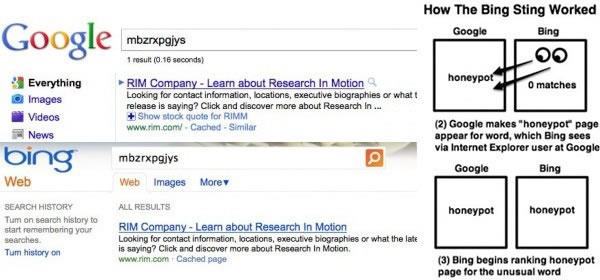Update: Bing has replied to these accusations outright denying Google's claims. We'll let you be the judge.
Search Engine Land has published an article detailing a "sting operation" that has led Google to accuse Bing of cheating on its search results. As the story goes, last year Google noticed that its competitor was showing very similar top results for misspelled searches. Suspecting shenanigans, the search giant manually placed a bogus page as the top result for 100 synthetic searches that few, if any people would actually enter (queries like hiybbprqag).
For the top results, Google inserted pages with no relevance to the search queries, so it would be pretty damning if Bing started showing the same results. Google thought Microsoft might have been copying results from data sent by Internet Explorer users, so it had a group of engineers run the test queries from IE with Suggested Sites and the Bing Toolbar enabled. Sure enough, less than two weeks later, some of the obscure results began appearing on Bing.

Microsoft promptly responded to the allegations in a blog post, calling the story a "spy-novelesque stunt to generate extreme outliers in tail query ranking." "It was a creative tactic by a competitor, and we'll take it as a back-handed compliment. But it doesn't accurately portray how we use opt-in customer data as one of many inputs to help improve our user experience," the Bing team said. "We all learn from our collective customers, and we all should."
"We use over 1,000 different signals and features in our ranking algorithm. A small piece of that is clickstream data we get from some of our customers, who opt-in to sharing anonymous data as they navigate the web in order to help us improve the experience for all users," Microsoft explained. Is the company truly cheating though? Some say Bing is leeching off Google's innovation while others see Bing as a clever underdog. Where do you stand?